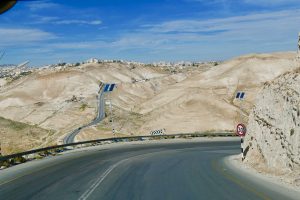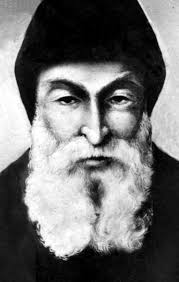HOMILY WEEK 16 03 – Year I
Life as a Wilderness Journey of Faith –
Optional Memorial: St. Sharbel Makhluf
(Ex 16:1-15; Ps 78; Mt 13:1-9)
*******************************************
The longest journey in the world is often from our heads to our hearts.
Today’s readings lead us into a wilderness journey to deeper faith and more mature prayer.
It is no accident that the Israelites, upon their liberation from Egypt, were led by God into a 40-year journey through the wilderness, when a direct journey to where Jerusalem is today might have taken six days. There were very important lessons for life they had to learn only time in the wilderness would be able to teach them.
 A first lesson would be precisely the importance of a wilderness or desert experience in our lives at times. The desert or wilderness strips away all the distractions and extraneous elements of life, allowing us the opportunity to discover our inner core and identity.
A first lesson would be precisely the importance of a wilderness or desert experience in our lives at times. The desert or wilderness strips away all the distractions and extraneous elements of life, allowing us the opportunity to discover our inner core and identity.
Recently I conducted a retreat based on my new book Still Green and Growingat the Star of the North Retreat Centre in St. Albert for about 40 participants. The oldest was 92, a former university professor, very sharp and alert. The retreat focused on “aging” stirred up some unresolved issues within her, so she decided to book herself into the retreat centre for a short private personal retreat. I met with her three times during that retreat, and marvelled at how she was, for the first time in her life, getting in touch with her emotions, discovering her true self, becoming more aware of the need to forgive some persons in her life, finding she needed to grieve some of her losses, and finally, joyfully beginning to access her true self. She had chosen, at the ripe age of 92, to go into the wilderness, into the desert, to make that journey from her head (she has a Phd in mathematics and physics) into her heart.
Another lesson from the wilderness, obvious in the first reading today, is to live one day at time (a well-known slogan of the A.A. program), trusting in God’s providence. God would send them manna which they would gather in the morning just for that day (what they gathered in excess would spoil and go bad), and quail in the evening. They were learning to live in the present moment, to trust God would provide what they needed for that day. We would do well to learn from the Israelites those same lessons for our own lives.
This focus on living one day at a time leads us into the prayer of the Anawim, the poor people who know they need God. This is the lesson St. Peter learned when walking on the water. His first prayer to Jesus was sort of proud and from his head (“Lord, make me come to you on the water.” To his credit, he had enough faith to step out of the boat and onto the water at Jesus word, “Come.” But then I think he got a bit proud, took his eyes of Jesus, turned back to the boat to show off a little to his companions, felt the wind, and suddenly began to sink. Then his prayer changed – it became three words only, “Lord, save me!” coming straight from this gut.
Suddenly Jesus was there to lift him up and ask him why he doubted. What do you think Peter did next? Tell Jesus he could manage on his own again, or hang onto Jesus and walk together with him back to the boat? I think he hung on for dear life, and walked back with Jesus to the boat.
That is the prayer of the Anawim, the prayer of those who know they need God. If we are honest, we have to admit there is no way we can live this day the way God wants us to live it on our own, without God’s help. In terms of addictions awareness, anyone can get through a day sober if they are afraid enough, or stubborn enough, but they won’t be healing – they will probably experience what is known as a dry-drunk – not practicing the addiction, but also not healing or changing – just staying stuck in the same old habits and attitudes and not happy or free. Turning to Jesus each morning to receive his help is the key to breaking through to a new deeper relationship with Jesus.
Jesus, recounting the parable of the Sower in the gospel, invites us to make an inner journey into a deeper faith and different kind of prayer, one that will ground us in God’s word. The seed in this parable is the Word of God, and the ground is our faith, in our minds and our hearts. The goal is to be full of faith, trust in the power of God’s word, ponder that word, and allow it to touch our hearts and minds, and transform our lives.
The other options are for us to be hard-hearted with closed minds. We may hear the word of God, but it has no effect on us. We are like those who attend a Cursillo or go for treatment, and come out of that experience unchanged and unmoved – we are that hard path that allows the birds of the air to devour the seeds lying exposed on hard ground. Or we may actually come away energized and excited at what we have experienced, but as soon as we return to our daily routine, it is all forgotten and makes no difference in our lives – like seed the germinates but is too shallow to survive.
Or we may actually experience some transformation, put into practice some of the teachings we have learned, become involved to a certain extent, but that doesn’t last either, as we get distracted by many things and events, and our commitment over time begins to faith – we are the plants slowly being choked out by other preoccupations.
What Jesus wants is disciples who express their faith in him by making his word a priority in our lives, reading it every day, pondering it, learning from it, allowing it to penetrate our hearts and minds, and slowly but surely transform our lives, out way of thinking, our way of behaving in this world, and heal our emotions.
Lectio Divina is a wonderful way to become that fertile ground for God’s word – reading a passage, meditating on that passage, praying with that passage, and finally, putting everything aside and just remaining in God’s presence, soaking up God’s love in the silence, which is the language God speaks best.
Today, the Church honors someone who lived the message of these readings today –  who went into the wilderness, who prayed the prayer of the Anawim, who was a contemplative, St. Sharble Makhluf. Joseph Makhluf was born in the mountains of Lebanon in 1828. At the age of 20 he joined a monastery in the Maronite rite, where he took the name of a 2ndcentury martyr, Sharbel. He lived there as a monk, but longed to live as a hermit in the desert. His superiors granted his wish in 1875 and he spent the next 23 years in a life of fasting, prayer and manual labor. He was famed for his holiness, wisdom and devotion to the Blessed Sacrament. He died in 188 and was canonized in 1977.
who went into the wilderness, who prayed the prayer of the Anawim, who was a contemplative, St. Sharble Makhluf. Joseph Makhluf was born in the mountains of Lebanon in 1828. At the age of 20 he joined a monastery in the Maronite rite, where he took the name of a 2ndcentury martyr, Sharbel. He lived there as a monk, but longed to live as a hermit in the desert. His superiors granted his wish in 1875 and he spent the next 23 years in a life of fasting, prayer and manual labor. He was famed for his holiness, wisdom and devotion to the Blessed Sacrament. He died in 188 and was canonized in 1977.
The Eucharist pulls all these themes together for us. It can be a wilderness experience which sets us aside to journey into our inner selves and need for forgiveness in the Penitential Rite, helps us focus on God’s word through the readings, and provides us with an intimate moment of contemplative union with God through communion with the very body and blood of Jesus.
May our celebration empower us to go into the wilderness at times to deepen our relationship with God and ourselves, strengthen our faith, and lead us into a more mature prayer life, as well as help us share our experience of God’s love with others.




Oh yes, we are to go out into the wilderness to strengthen our relationship with God including ourselves. Please God help us and lead us into more mature prayer life and helping us share our experience of God’s love with others. The message and reflection is quite clear what need to do to build this intimate relationship with God. Do we trust God or Jesus Christ ? Are we willing to surrender ourselves to God or put our life in Jesus’ hands and he will work any miracles to forgive us and heal us. We an experience his unconditional love, mercy , healing and compassion leading to a more mature prayer life. Then, he sent us to share his love to other people . Amen . Many Blessings!
Thanks again for the beautiful message and lessons we need to learn in our daily lives. What is it like to be closer to God by going into the wilderness . Gracias! Bravo! Merci! ???❤️?